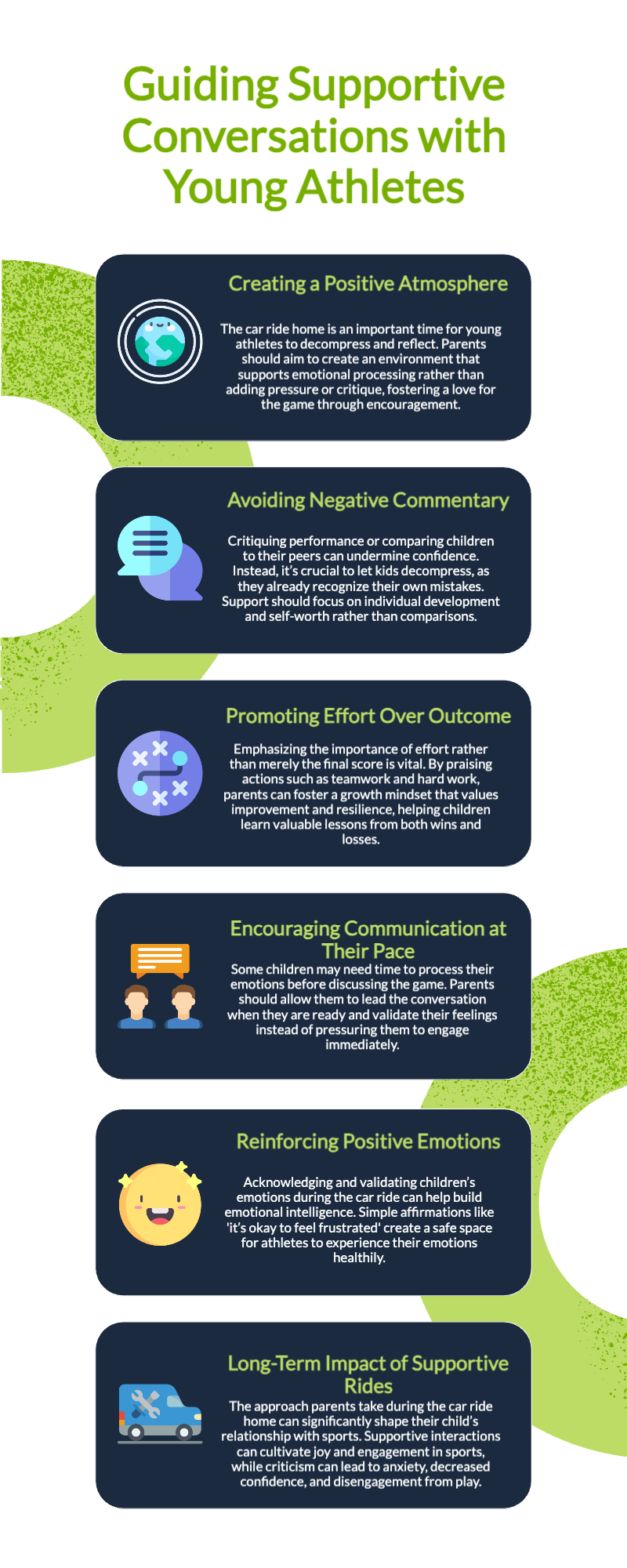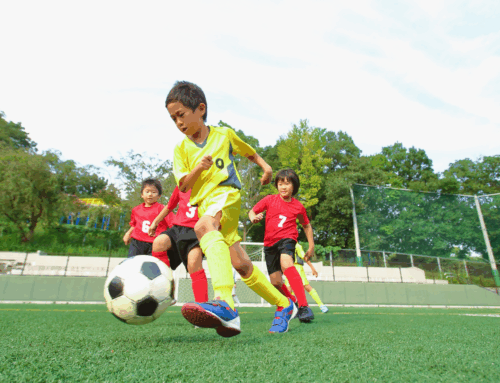Get our exclusive report. Download the iSport360 Club Switching Report Here – For Club Admins, Rec Leaders and Coaches.
What Parents Can Say On the Car Ride Home?
For many young athletes, the car ride home after a game or practice can be a crucial moment. It’s a time when emotions run high—whether it’s excitement from a big win, frustration from a tough loss, or exhaustion from giving their all on the field. As a parent, how you handle this car ride can shape your child’s experience with sports, their confidence, and their long-term love for the game. The right approach can foster resilience, growth, and enjoyment, while the wrong approach can lead to stress, anxiety, and even burnout.
The Importance of the Car Ride Home
Youth sports are about much more than winning and losing; they’re an opportunity to develop teamwork, discipline, and a strong work ethic. However, the car ride home can sometimes turn into an unintended interrogation or lecture, leaving kids feeling pressured rather than supported. The goal as a parent should be to create a positive and encouraging environment where your child feels safe to process their experience, regardless of the outcome.
What to Avoid on the Car Ride Home
1. Critiquing Performance Immediately
It can be tempting to break down every mistake or missed opportunity right after the game, but this is often the last thing your child needs. They already know what went wrong, and their coach will address technical aspects in practice. Instead of pointing out errors, allow them space to decompress.
Most kids know how they did, they know when they made a mistake and they don’t need to relive the game or play again. Let them decompress from the activity. I loved taking my daughter or son to get ice cream, this was just something fun to do and it allowed us to just chill and have fun.
2. Comparing to Other Players
Saying things like “Did you see how well your teammate played?” or “You should be more like [another player]” can be discouraging. Every child progresses at their own pace, and comparing them to others can damage their confidence and enjoyment.
As a coach, this is one of the hardest things to watch. Players do not need to be compared to others, it only leads to low self-esteem and low confidence, two things you don’t want your player to have. Instead, let them focus on what makes them special.
3. Focusing Only on the Outcome
Winning feels great, but emphasizing only the final score can make kids feel like their worth is tied to results rather than effort and improvement. Avoid statements like “We should have won” or “That was embarrassing.” Instead, highlight what they did well and how they can grow from the experience.
Sports are great, they teach awesome life lessons. The outcome is the outcome, you will win some and lose some but you will always learn something. And as a coach, I tell my kids to focus on effort and attitude. If you put it all on the table, even when the outcome doesn’t happen the way you want, at least you know you played to win.
4. Pressuring Them to Talk
Some kids need time to process their emotions before discussing the game. If they’re quiet, that’s okay. Forcing them to talk before they’re ready can make them withdraw further.
See above and read it again. If they are quiet, that is ok. They want to decompress and will talk if they want.
What to Do Instead
1. Start with Positivity
Begin the conversation with something encouraging, no matter the outcome. Try saying, “I loved watching you play today,” or “You worked really hard out there.” This sets a positive tone and reassures them that their effort is valued.
Effort and attitude is the best, they are two things you can control. In sports, there is a lot outside of your control so focus on those things.
2. Let Them Lead the Conversation
If your child wants to talk about the game, let them initiate the discussion. They might share their frustrations or highlights when they’re ready, and your role is to listen and validate their feelings.
Being patient is key, some players want to talk and some don’t. For those that want to talk, let them be empowered to have the space to speak their minds. Try to focus on being a great listener. You will also be surprised by
3. Ask Open-Ended Questions
Instead of focusing on the score, ask questions that help your child reflect on their experience in a constructive way:
- “What was your favorite part of the game?”
- “Did you have fun?”
- “What did you learn today?” These questions encourage self-reflection without making them feel pressured.
This is one of my favorites both as a coach and a sports parent. You learn so much just from the questions you ask.
4. Reinforce Growth and Effort
Praise their hustle, teamwork, or a specific play they executed well. Statements like “I saw how hard you were working on defense” or “You really supported your teammates today” reinforce a growth mindset and help them focus on improvement rather than just results.
It is really about controlling what they can control, and sometimes that isn’t a lot. Effort and attitude is key, it may not impact the outcome of the game but they will know they did their very best.
5. Keep It Light and Fun
Sometimes the best way to support your child is to shift the focus away from sports altogether. Play their favorite music, talk about something unrelated, or stop for a treat. This helps reinforce that their identity isn’t just tied to their athletic performance.
I vote for ice cream and shopping. Again, this keeps the situation light for your athlete. It also builds trust and allows you to be part of the process.
6. Support Their Emotional Needs
If your child is upset, acknowledge their feelings instead of trying to fix them immediately. Saying, “I can see you’re frustrated—it’s okay to feel that way” validates their emotions and builds emotional intelligence. Sometimes they just need a hug or a simple “I love you” to feel better.
Validating their emotions is good when it is done in a healthy way. It is ok for athletes to feel sad, mad, frustrated or uncomfortable. Embrace that and tell them it is ok. I usually tell my players after a tough loss, you have a day to pout then you move on.

The Long-Term Impact of a Supportive Car Ride
The way parents handle the car ride home can significantly impact a child’s relationship with sports. When kids feel safe, supported, and encouraged, they are more likely to enjoy the game, work hard, and stay engaged. On the other hand, if they feel criticized or pressured, they may become anxious, lose confidence, or even quit.
A parent’s role in youth sports is not to be a coach or critic, but rather a source of unwavering support. The best gift you can give your child is the freedom to love the game on their own terms. By focusing on positivity, effort, and enjoyment, you help them develop not only as athletes but as confident and resilient individuals.
So, next time you pick up your young athlete after a game, remember: that your words and approach matter. A simple “I love watching you play” might be the only thing they need to hear.
iSport360 is the only app that does it all for youth sports. For more information on what we do, click here.
About the author:
Amy Masters is a sports mom, coach, and club administrator. She has been coaching youth sports for more than 10 years. She started Jr Lions Field Hockey, the youth recreation program for the Hunterdon County community growing it from 40 players in year 1 to 150 players by year 3. A few years later, she saw the love and competitiveness grow then started Omega Field Hockey Club serving NJ and PA players. Before coaching, she was a collegiate field hockey player for Lock Haven University. In her spare time (lol), she is head of marketing for iSport360 and the co-editor of the Youth Sports Survival Guide. The Youth Sports Survival Guide is the largest youth sports newsletter in the world.
Learn more or request a demo of our youth sports software that is helping teams improve communication, organization and player development.
March 14, 2025





